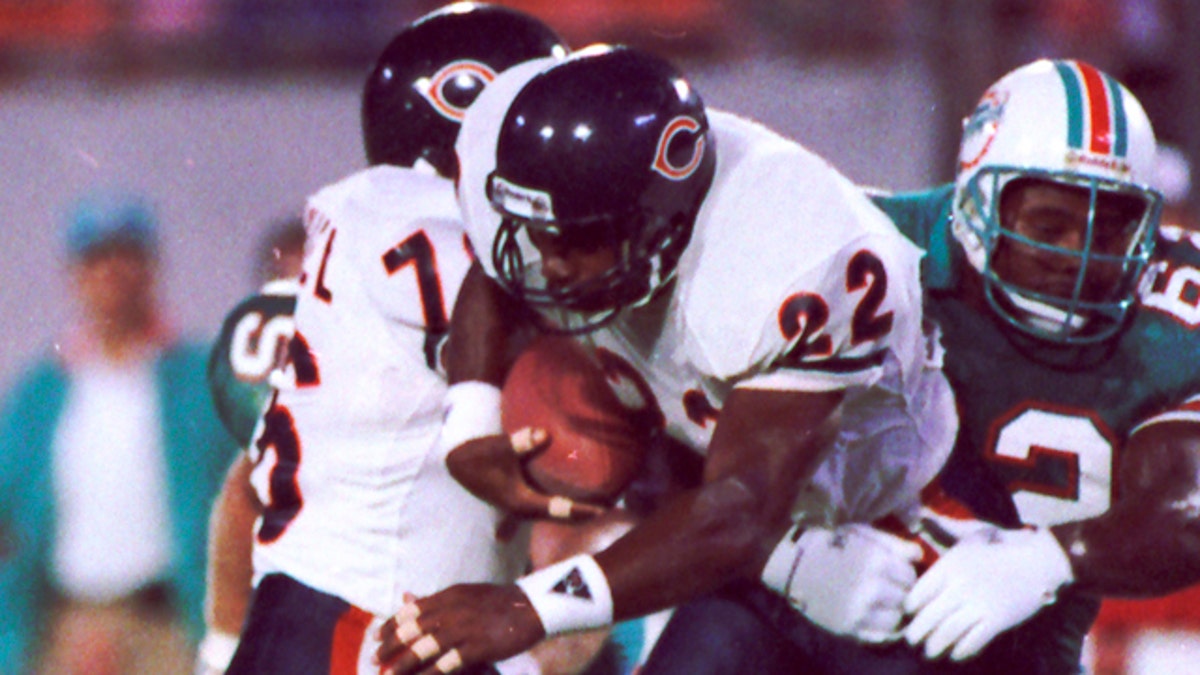
In this Aug. 14, 1989, file photo, Chicago Bears safety Dave Duerson (22) scrambles for running room after intercepting a pass as Miami Dolphins Jeff Uhlenhake (63) grabs hold during an NFL football game in Miami. (AP)
NEW YORK -- Mike Ditka remembers seeing Dave Duerson at a reunion of the '85 Bears just a few months ago, and everything seemed fine.
Yes, Duerson's business had failed, he'd divorced and lost his home to foreclosure, but he seemed to have put it behind him. He was getting married again in April and spoke with optimism of the future, showing the kind of resolve that helped him reach four Pro Bowls, two Super Bowls and bounce back from countless bone-jarring hits over an 11-year career.
So it was understandable that Ditka felt numb this week when he learned that Duerson, one of the anchors of that fearsome Bears defense, had committed suicide at the age of 50.
"We had the anniversary party, and he seemed fine, you know?" the former coach said in a telephone interview Sunday. "I knew he had some problems, but I honestly didn't know."
Duerson was found Thursday in Sunny Isles Beach, Fla., and the Miami-Dade medical examiner ruled his death a suicide on Sunday, Miami-Dade police spokesman Roy Rutland said. There was no word on whether a note was left, though the New York Times reported that Duerson had sent text messages to his family asking that his brain be examined for chronic traumatic encephalopathy, a degenerative disease tied to depression, dementia and suicide.
Messages left by The Associated Press with his ex-wife, Alicia, and other family members were not returned.
Chris Nowinski at the Center for the Study of Traumatic Encephalopathy at Boston University School of Medicine told The Associated Press he was contacted by a representative of the NFL Players Association on behalf of the family Friday, then secured the donation later in the day.
Nowinski said the brain eventually will undergo a battery of studies looking for any disease or abnormality, but focused on CTE, which has been found in a number of former athletes.
"The goal of the research is both to better understand the disease so we can treat it, develop a diagnostic test for people while they're alive, and also use the information to develop better prevention for current athletes," Nowinski said Sunday.
CSTE is a collaboration between Boston University Medical School and the Sports Legacy Institute that is attempting to address what it calls the "concussion crisis" in sports. The group has been at the forefront of research into head trauma in sports, and has received a $1 million gift from the NFL, which it has pushed for better treatment of concussions.
Nowinski said more than 300 athletes, including 100 current and former NFL players, are on the CSTE's brain donation registry. There are 65 cases currently being studied.
"You can never link a single act to a disease, however, a large percentage of CTE cases have committed suicide," Nowinski said. "It's a potential link, something we have to explore."
Duerson was a third-round pick of the Bears in the 1983 draft out of Notre Dame, and he became a full-time starter for the '85 team that shuffled all the way to the Super Bowl. The safety went to four Pro Bowls from 1986-89, then went to another Super Bowl with the 1990 New York Giants, before wrapping up his career with the Arizona Cardinals.
After he retired, Duerson owned several McDonald's franchises and later helped to grow a company that supplied fast-food restaurants. He left to start his own company in 2002.
Things began to turn sour in the years that followed, though. His food-supply company was forced into receivership in 2006, and Duerson filed for divorce from his wife a year later. He lost his Chicago-area home to foreclosure, and his position as Notre Dame trustee after pleading guilty to a misdemeanor domestic battery charge.
"I knew he had some problems, I knew he lost the business, I knew all that," said Ditka, whose Gridiron Greats Assistance Fund helps provide for retired players, which includes funding research into health-related issues like traumatic brain injuries.
"It's just a tragedy," Ditka said. "It really is."
Jim Morrissey, a linebacker for the '85 Bears, said the news of their teammate's death spread quickly through the close-knit team, with each player calling several others. More than anything else, Morrissey said, they wanted to offer each other their support -- to make sure that nobody else was going through anything that would lead them to take their own life.
"For someone to leave us at age 50, very young, active and in great shape, good health, that's tragic. It's way too early for someone to pass," Morrissey said. "We were just hoping he would have said something, that we could have helped.
"This is a bad situation," Morrissey said. "We just wanted each other to know that, hey, if there's anything that ever comes out or you need someone to talk to, we're here."
NFL Commissioner Roger Goodell said as he arrived for labor negotiations Sunday that he didn't know details about Duerson's case, but he certainly knew of his reputation.
"He's a good man," Goodell said. "It's sad."
